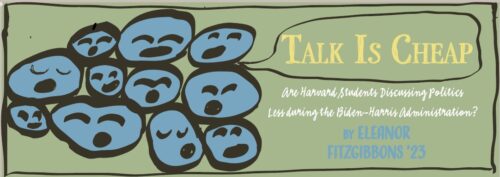After four years of conversations revolving around politics and the man in the White House, the United States is now two months into Joe Biden’s presidency, and conversations about politics at Harvard are seemingly few and far between. It’s not as though there isn’t anything to talk about. The nation is still in the middle of a global pandemic, and Biden signed a $1.9 trillion dollar relief bill earlier this month. The US has rejoined the World Health Organization and the Paris Climate Agreement, and Biden has already signed 37 executive orders since he entered office. So why aren’t Harvard students talking about all this?
Donald Trump polarized student opinions more than Biden has; most Harvard students seemed to have an opinion on Trump, whether they loved or hated him as a president or as a person. Many conversations on Harvard’s campus regarding Trump in the last year were also centered around the pandemic. Students debated the best course of action to handle COVID-19, and conversations inevitably led to politics and back to Trump.
Since Biden has been in office, even political conversations with regard to the pandemic have dwindled. Anna Wolf ’23 offers an explanation for this pattern. “I think Trump politicized the pandemic, and because [the pandemic] impacts our daily lives so much, people had no choice but to involve themselves in politics.” Biden’s administration has actively tried to distance COVID-19 from politics, and its efforts have been reasonably successful so far. Politicians from both sides of the aisle have been encouraging their constituents to receive the vaccine, and one could argue that the pandemic is slowly becoming less of a partisan issue. Wolf ties this phenomenon back to conversations on campus as she says, “Now that COVID-19 isn’t a political game, politics are less relevant for everyday Americans.”
Outside of the pandemic, Harvard students also used to discuss Donald Trump’s character and personality more than they do Biden’s. Due to the polarizing nature of Trump, his administration perhaps lent itself more easily to casual conversations. Ryan Stanford ’23 says, “I feel like, leading up to the previous election and while Trump was in office, I heard a lot more political discussion happening in my social circles.” There certainly was more conversation material regarding Trump that was outside of strictly political conversations during the previous administration.
During Trump’s presidency, Harvard students could often be heard discussing the former president’s personal life along with his administration’s policies. Carli Cooperstein ’24 comments, “I’ve found that since Biden has taken office, I’ve still been engaging in conversations with my friends about politics, though I think these conversations take place less frequently and were more topical under Trump due to the prevalence of controversial events that took place during his presidency.” This pattern furthers the proposition that Biden’s presidency has provided less material for casual conversation due to the commander-in-chief at its helm.
While it may seem as though Harvard students are now discussing politics less often on campus, it may be the case that political discourse under the new administration is not as frequent but is more substantive. Tobias Edelstein ’23 agrees with Cooperstein’s earlier comment that student discourse during Biden’s administration is “definitely less topical” now than it was under Trump. Edelstein expresses gratitude for the shift away from topical conversations, “largely because of how volatile they can be.” He adds, “I’m happy to discuss politics with peers but conversations turn into arguments too often in the status quo.” From the pattern of discourse at Harvard, it seems as though the status quo of conversations turning into debates will not be a long-lasting legacy of Trump’s presidency. Instead, conversations on campus are becoming less combative as the country moves forward under a less polarizing president.
Additionally, the departure from superficial discourse has allowed for the country to pay more attention to issues previously stifled in the media. Anti-Asian American and Pacific Islander hate has increased enormously ever since the beginning of the pandemic, yet the media and Harvard didn’t properly address the concern until this month. Regardless of whether or not social justice issues are receiving the attention they deserve both in the media and in public discourse, people all over the country are still impacted by them. It is a privilege to be able to pick and choose which issues to discuss, and one that Harvard students should not forget.
Harvard students are glad to depart from a time when shallow discussions detracted from important debates that need to be had in this country. Cooperstein remarks, “I think one aspect of Harvard that is truly special is that the majority of the students are very well-informed and interested in talking about what’s going on in our country.” Though the buzz of Trump is now relatively absent from the media and campus conversation, Harvard students have not stopped caring about politics and are looking forward to a return to substantive conversations during Biden’s administration.
Eleanor Fitzgibbons’23 (efitzgibbons@college.harvard.edu) is the Vice President of the Independent.

